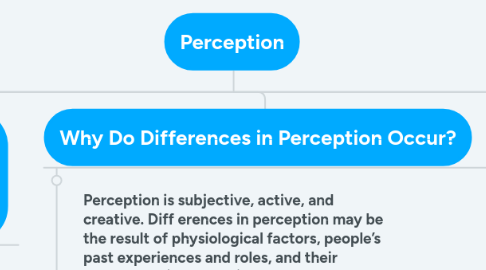Perception
by carey viaud


1. Perception: The process of using the senses to acquire information about the surrounding environment or situation
1.1. Perception influences our experiences, our assessment of others, and our communication with them. The way you sense the world, the way you see, hear, smell, touch, and taste is subjective, uniquely your own. Nobody else sees the world the way you do, and nobody experiences events exactly as you do.
1.1.1. Diff erences in perception aff ect the way we understand events, others, and ourselves. Consequently, perception aff ects the way we view ourselves and the way we present ourselves
2. Active Perception: Perception in which your mind selects, organizes, and interprets that which you sense.
2.1. Each person’s lens is different; each person sees different colors; and each person’s audio picks up different sounds. Perception is subjective because you interpret what you sense; you make it your own, and you add to and subtract from what you see, hear, smell, and touch.
3. Why Do Differences in Perception Occur?
3.1. Perception is subjective, active, and creative. Diff erences in perception may be the result of physiological factors, people’s past experiences and roles, and their present feelings and circumstances
3.1.1. What Occurs in Perception?
3.1.1.1. You engage in three separate activities during perception: selection, organization, and interpretation. You are likely unaware of these processes because they occur quickly and all at once. Nonetheless, each plays a discrete role in perception. In turn, our perceptions aff ect our communication
4. Subjective perception: Your uniquely constructed meaning attributed to sensed stimuli.
4.1. Consider how much your inner state affects your perceptions. If you have a bad headache, the pain probably will affect the way you treat your children, the way you respond to the workers at the shop, and even the way you see yourself in the mirror. One woman expressed the problem like this: “I need to work on disguising my mood because when I act indifferent toward what people are saying, they may think I’m silent because I do not like them as a person or I disagree with what they are saying
5. Perceptual constancy: The idea that your past experiences lead you to see the world in a way that is difficult to change; your initial perceptions persist.
5.1. “A perceptual characteristic that affects my communication with others,” said a male student, “is that I am very well-mannered. I am an only child, and my parents raised me very strictly to always treat others with respect, and put them before yourself. I also attended a Catholic elementary, middle, and high school where the golden rule of ‘treat your neighbor as yourself’ was always endorsed and upheld.” 5 What happened to you in the past influences your current perceptions. A bad experience in a given situation may cause you to avoid that situation in the future. Your experiences affect how you respond to professors, police, and politicians.
5.1.1. Role: Is the part you play in various social contexts. Jason observed that being “the boss” was effective at work, but not in his student role.

